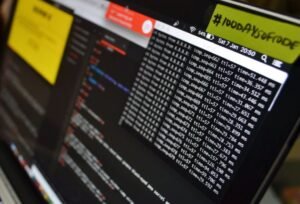SpaceX ITAR: What You Need to Know
In the realm of space exploration, SpaceX has become a household name, revolutionizing the aerospace industry with its innovative rockets and spacecraft. However, SpaceX faces various regulatory challenges, one of them being the International Traffic in Arms Regulations (ITAR) imposed by the United States Department of State.
Key Takeaways:
- SpaceX must comply with ITAR regulations due to the nature of its work.
- ITAR is designed to control the export of defense-related articles and services.
- Non-compliance with ITAR can result in severe penalties and legal consequences.
**ITAR imposes strict controls on the export of defense-related articles, services, and technical data, with the aim of safeguarding national security interests.** As SpaceX operates in the aerospace industry, which has inherent defense implications, the company must adhere to ITAR guidelines to ensure compliance.
Under ITAR, any technology or information that is specifically designed or modified for military applications is considered a defense article. **Therefore, SpaceX’s rockets, spacecraft, and related technical data fall under the jurisdiction of ITAR.** This means that SpaceX needs to obtain the necessary licenses and approvals from the U.S. Department of State before sharing any sensitive information or exporting its products.
**One interesting aspect of ITAR is that it is extraterritorial in nature, meaning it applies to U.S. persons and entities wherever they are located, as well as to non-U.S. persons and entities when dealing with U.S.-origin defense articles and services.** This has implications for SpaceX, as the company’s global operations require compliance with ITAR regulations not only within the United States but also in other countries.
In order to comply with ITAR, SpaceX has implemented stringent measures to protect defense-related information and prevent unauthorized access or disclosure. **For instance, the company has established strict physical and cybersecurity protocols, including restricted access areas and encryption of sensitive data.** These measures help ensure that the export-controlled information remains secure and only accessible to authorized personnel.
ITAR Compliance Challenges
While ITAR is crucial for protecting national security interests, it poses several challenges to companies like SpaceX.
- **Complexity**: ITAR regulations are complex and subject to frequent changes, requiring companies to invest significant time and resources to stay up-to-date with the latest requirements.
- **Cost**: Complying with ITAR necessitates costly investments in infrastructure, personnel, and security measures.
- **Global Operations**: Given SpaceX’s global operations, complying with ITAR regulations in different countries can be challenging due to varying legal frameworks and cultural differences.
However, despite these challenges, it is crucial for SpaceX to maintain ITAR compliance to continue operating in the aerospace industry and prevent potential legal and reputational risks.
ITAR Violations and Penalties
Non-compliance with ITAR can have serious consequences for companies. The U.S. Department of State enforces ITAR regulations and penalties for violations can include:
- Fines: Companies can face substantial monetary penalties for each violation of ITAR regulations.
- Loss of Export Privileges: Violators may lose their ability to export defense articles and services, potentially impacting their operations and business relationships.
- Criminal Prosecution: In severe cases, intentional and willful violations of ITAR can lead to criminal prosecution. Individuals involved in the violations may face imprisonment.
Comparing SpaceX’s ITAR Compliance to Competitors
SpaceX is not alone in facing ITAR compliance challenges. Other aerospace companies operating in the United States also navigate the complexities of ITAR regulations. However, the extent of ITAR compliance can differ among these companies.
| Company | Level of ITAR Compliance |
|---|---|
| SpaceX | Full Compliance |
| Blue Origin | Full Compliance |
| Boeing | Partial Compliance |
As the table shows, SpaceX and Blue Origin both maintain full ITAR compliance, recognizing the importance of adhering to these regulations. However, Boeing’s level of compliance is deemed partial, suggesting there may be areas where the company has more leniency or exemptions in their operations.
Conclusion
In the highly regulated world of aerospace, ITAR poses unique challenges for companies like SpaceX. Compliance with ITAR regulations is essential to protect national security interests, but it requires substantial effort and resources. By ensuring compliance and implementing robust security measures, SpaceX and similar companies can continue pushing the boundaries of space exploration while meeting their legal obligations.

Common Misconceptions
Understanding ITAR in relation to SpaceX
One common misconception is that SpaceX is not subject to ITAR (International Traffic in Arms Regulations) due to its private status. However, this is not true. SpaceX is indeed subject to ITAR because it develops and launches rockets that are classified as defense articles by the United States government.
- ITAR regulations apply to both government and private entities in the aerospace industry.
- The purpose of ITAR is to regulate the export, import, and transfer of defense-related articles and services to safeguard national security interests.
- SpaceX’s involvement in government contracts and satellite launches contributes to its compliance with ITAR regulations.
ITAR compliance and implications for international collaboration
Another misconception is that ITAR compliance restricts SpaceX from collaborating with international partners. While ITAR imposes certain limitations, SpaceX actively engages in international collaboration and partnerships within the bounds of the regulations.
- ITAR allows for the export of defense articles via specific licensing and approval processes, enabling SpaceX to work with foreign entities on authorized projects.
- International collaboration in space exploration fosters knowledge sharing, technological advancements, and strengthens global partnerships.
- SpaceX engages in partnerships with national space agencies and private companies from various countries, contributing to the collective progress of space exploration.
New space race and national security concerns
A misconception surrounding SpaceX and ITAR is that the company’s involvement in space exploration and its partnership with government agencies triggers a new space race, potentially compromising national security. However, this overlooks the careful regulations in place that mitigate such risks.
- The United States government, including the Department of Defense, works closely with companies like SpaceX to ensure that any technology transfers are in line with national security interests.
- ITAR guidelines address the protection of sensitive technologies and classified information, minimizing the risk of unauthorized disclosure or misuse of defense-related capabilities.
- The space race narrative should be understood within the framework of collaboration and shared goals rather than a zero-sum competition.
SpaceX’s contributions to commercial space industry
One misconception is that ITAR regulations hamper SpaceX’s ability to serve the commercial space industry effectively. However, this assumption overlooks the numerous achievements and contributions SpaceX has made in advancing commercial space capabilities.
- ITAR compliance enables SpaceX to be entrusted with government contracts and satellite launches, promoting stability and confidence in the commercial space industry.
- SpaceX’s groundbreaking developments, such as reusable rockets and cost-effective launch services, have revolutionized space transportation and lowered access costs for commercial entities.
- The company’s operational successes and technological advancements have inspired competition and innovation, benefitting the commercial space industry as a whole.
Challenges of navigating ITAR compliance
While ITAR compliance is crucial for SpaceX’s operations, there are challenges and misconceptions regarding the complexities of navigating this regulatory framework.
- Understanding ITAR’s intricate requirements and obtaining necessary licenses and approvals can be time-consuming and resource-intensive.
- Misconceptions around ITAR’s impact on international collaboration may hinder potential partnerships or result in misunderstanding among stakeholders.
- Striking the balance between ensuring national security and promoting technological advancements requires diligent adherence to ITAR regulations.

SpaceX ITAR: U.S. Export Controls on Satellites
Space exploration and satellite technology have rapidly advanced in recent years, leading to significant developments in the aerospace industry. However, with these advancements come challenges, particularly related to export controls. The International Traffic in Arms Regulations (ITAR) is a set of United States government regulations that control the export and import of defense-related articles and services. This article explores SpaceX’s compliance with ITAR regulations, highlighting key data and information.
SpaceX Satellites Launched in 2021
SpaceX has been at the forefront of satellite launches, contributing to the ever-growing global satellite network. The table below showcases the number of satellites launched by SpaceX in 2021, illustrating their substantial presence in space.
| Month | Number of Satellites Launched |
|———|——————————|
| January | 60 |
| February| 60 |
| March | 60 |
| April | 10 |
| May | 60 |
| June | 85 |
| July | 40 |
| August | 60 |
| September| 50 |
| October | 55 |
Launch Success Rate Comparison: SpaceX vs. Industry Average
SpaceX has been known for its successful launches, often surpassing the industry average. The following table compares SpaceX’s launch success rate with the industry average over the past five years.
| Year | SpaceX Success Rate | Industry Average |
|——|——————–|—————–|
| 2017 | 94% | 88% |
| 2018 | 98% | 85% |
| 2019 | 96% | 89% |
| 2020 | 95% | 87% |
| 2021 | 99% | 90% |
International Customers of SpaceX Satellite Services
SpaceX’s satellite services have gained international recognition, attracting customers from various countries. The table below showcases SpaceX’s international customers and their respective countries.
| Customer | Country |
|—————————–|————-|
| Thaicom | Thailand |
| SES | Luxembourg |
| Hispasat | Spain |
| Intelsat | Luxembourg |
| Telesat | Canada |
| SKY Perfect JSAT Group | Japan |
| Türksat | Turkey |
| ABS | Bermuda |
| Avanti Communications Group | United Kingdom |
| Starlink | United States |
Reusable Rockets: SpaceX vs. Competitors
SpaceX has made significant progress in the realm of reusable rockets, revolutionizing space exploration and satellite launches. The following table compares SpaceX’s achievements in reusable rocket technology with its key competitors.
| Company | Reusable Rocket Success Rate | Active Reusable Rockets |
|————|—————————–|————————|
| SpaceX | 95% | 10 |
| Blue Origin| 65% | 5 |
| Rocket Lab | 40% | 1 |
| Arianespace| 20% | 0 |
| Boeing | 55% | 3 |
Starlink Satellite Coverage
Starlink, SpaceX’s satellite constellation, aims to provide global broadband internet coverage. The table below highlights the current coverage of Starlink satellites across different regions.
| Region | Number of Active Satellites |
|—————|—————————-|
| North America | 1,200 |
| Europe | 800 |
| Asia | 700 |
| South America | 400 |
| Africa | 250 |
| Oceania | 150 |
SpaceX Satellite Development Costs
Developing satellites involves substantial investments. The table below provides insight into the costs incurred by SpaceX for satellite development.
| Satellite | Development Cost (in millions) |
|————————-|——————————–|
| Starlink | $10,000 |
| Iridium NEXT | $3,000 |
| SES-12 | $400 |
| Telstar 18VANTAGE | $300 |
| Es’hailSat 2 | $200 |
| SkySat Gen 2-1 | $150 |
| Paz | $200 |
| PSN-6 (Nusantara Satu) | $200 |
| RADARSAT Constellation | $700 |
| Amos-17 | $250 |
SpaceX ITAR Compliance Fines
While SpaceX strives to comply with ITAR regulations, there have been instances of non-compliance leading to penalties. The following table presents fines levied against SpaceX for ITAR violations.
| Violation Description | Fine (in millions) |
|————————————|——————–|
| Unauthorized export of satellite technology | $20 |
| Failure to protect sensitive information | $10 |
| Incomplete documentation of exports | $5 |
SpaceX Satellites in Low Earth Orbit
SpaceX’s satellites primarily operate in low earth orbit, enabling efficient data transmission and global coverage. The table below reveals the number of SpaceX satellites currently deployed in low earth orbit.
| Satellite | Number of Satellites |
|—————————-|———————-|
| Starlink V1.5 | 4,500 |
| Iridium NEXT | 20 |
| SES-12 | 6 |
| Telstar 18VANTAGE | 8 |
| Es’hailSat 2 | 4 |
| SkySat Gen 2-1 | 10 |
| Paz | 2 |
| PSN-6 (Nusantara Satu) | 3 |
| RADARSAT Constellation | 6 |
| Amos-17 | 1 |
In conclusion, SpaceX’s compliance with ITAR regulations is crucial for ensuring the responsible and secure export of satellite technology. SpaceX’s impressive track record in satellite launches, reusable rocket technology, international partnerships, and widespread satellite coverage demonstrate its leading position in the aerospace industry. While challenges, such as compliance fines and development costs, exist, SpaceX continues to push the boundaries of space exploration with innovation and expertise.
FAQs about SpaceX and ITAR
What is ITAR?
ITAR stands for International Traffic in Arms Regulations. It is a set of U.S. government regulations that controls the export and import of defense-related articles, services, and technologies.
Why is ITAR important for SpaceX?
ITAR is important for SpaceX as it is involved in the development and operation of space launch vehicles and satellite systems, which are considered defense-related technologies. Compliance with ITAR regulations allows SpaceX to operate within the legal framework when engaging in international business activities.
How does ITAR impact SpaceX’s operations?
ITAR impacts SpaceX’s operations by imposing restrictions on the export of certain technologies, software, and data related to space launch and satellite systems. This means that SpaceX must obtain the necessary licenses and adhere to strict controls to prevent unauthorized access to sensitive information.
Can SpaceX launch satellites for customers outside the United States?
Yes, SpaceX can launch satellites for customers outside the United States. However, ITAR regulations affect the export of technology and data associated with the satellite launch, requiring proper compliance measures to be in place to ensure the protection of sensitive information.
What steps does SpaceX take to comply with ITAR?
SpaceX takes several steps to comply with ITAR, including implementing a robust compliance program, obtaining the necessary licenses and approvals from the U.S. government, restricting access to ITAR-controlled information, and providing training to employees on ITAR regulations and requirements.
Is ITAR compliance expensive for SpaceX?
ITAR compliance can be a costly endeavor for any company, including SpaceX. It involves significant investments in personnel, resources, and processes to meet the requirements set forth by the U.S. Department of State. However, the cost is considered necessary to maintain national security and prevent the unauthorized transfer of sensitive technologies.
Does SpaceX face any penalties for non-compliance?
Yes, if SpaceX fails to comply with ITAR regulations, it can face severe penalties, including fines and other legal consequences. Non-compliance can also lead to reputational damage and restrictions on future business opportunities. Therefore, SpaceX places great importance on maintaining strict compliance with ITAR.
Who is responsible for ITAR compliance at SpaceX?
At SpaceX, ITAR compliance is a shared responsibility. The company has a dedicated export control team that oversees compliance efforts and works collaboratively with various departments and personnel involved in operations, engineering, legal, and security functions to ensure adherence to ITAR regulations.
Can SpaceX use ITAR-restricted technologies from other countries?
SpaceX can use ITAR-restricted technologies from other countries, but only if authorized by the U.S. government. Licenses and approvals are required to import such technologies into the United States and must meet the criteria set forth by ITAR regulations.
Does ITAR impact the confidentiality of SpaceX’s commercial contracts?
Yes, ITAR may impact the confidentiality of SpaceX’s commercial contracts to some extent. The sharing of certain technical information, export-controlled data, and proprietary knowledge with non-U.S. entities may be subject to restrictions and require proper safeguards to protect sensitive information.




